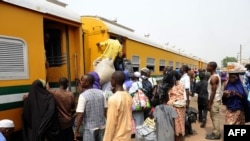Nigeria’s Transport Minister says the administration has allocated funds and implemented strategic plans to revitalize the country’s railway system, which has been in a poor state for decades.
Senator Idris Audu Umar said the government in Abuja has developed a 25-year plan as part of its effort to boost the railway system to improve the transportation of goods and services across the country.
“This vision plan is being pursued assiduously in order to resuscitate a rather comatose railway system,” said Umar. “We were operating the manual signaling system before and that created problems. Today, the Federal Executive Council has approved the upgrading of the signaling system. Therefore we are now going to have a modern and upgraded telecommunication system on the railway lines.”
He said there is a continued effort to ensure a strong public-private partnership to improve other aspects of the transportation sector, including marine and air transportation.
He added that the administration has encouraged the private sector to take the lead role in developing the country’s ports after the government divested its interests.
“As a matter of fact, all the ports that were initially owned by government have been concessioned out to [private] terminal operators,” said Umar. “We also have a policy of amortization where we give the private sector a greenfield they develop it then they recoup their investment through various services within the ports. [We are] encouraging the private sector to either develop some ports on their own or in collaboration with government.”
Some analysts have over the years expressed concern about the country’s lack of investment in railway infrastructure, which they contend has led to poor patronage and hampered businesses that rely on trains to transport goods and services.
Umar admits that previous administrations did not pay much attention to revamping the railway system in spite of the potential to boost agricultural and other businesses activities.
Nigeria has two main railway lines; the Western lines, which starts from Lagos to Kano and the Eastern line, which starts from Port Harcourt to Maiduguri.
“Over 90 percent of the existing railway lines that is 3500 Kilometers are being rehabilitated; some have been completed, while others are at advanced stages of completion,” said Umar. “We are working assiduously to complete the rehabilitation of the track from Port Harcourt. By October this year the trains will be moving from Port Harcourt to Jos to Kafanchan up to Kaduna.”
Some business experts say African governments have not been good at maintaining infrastructure despite heavy public funds investment. They argue that the investment could be a waste of tax payers’ money if the administration fails to ensure that there is an effective maintenance culture to regularly upgrade and improve the railway system.
Minister Umar says the administration has an outsourcing plan that involves the private sector to maintain the trains and the entire railway system.
Nigerians who have been patronizing the railway system have often complained about the lack of security, which they say leads to banditry and armed robberies on the trains. Umar says the police have been deployed to prevent attacks and protect life and property.
“We’ve taken proactive measures [and] there is a detachment of the Nigerian Railway police in charge of security in each coach we have one or two policemen to maintain internal security within the coaches,” said Umar/ “We are looking at the possibilities of even partnering with private security outfits in order to fortify what the police are doing in order to maintain security.”








